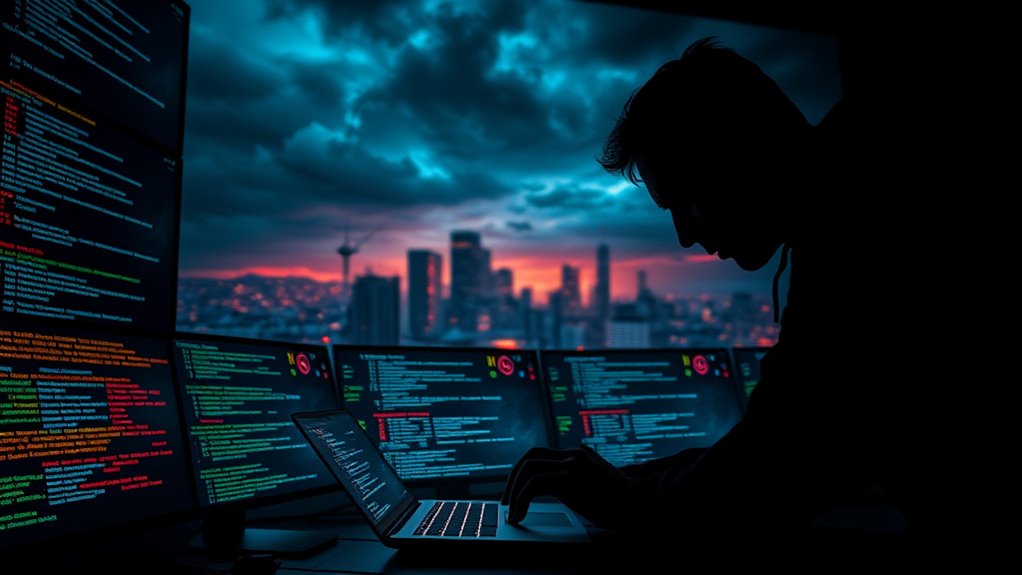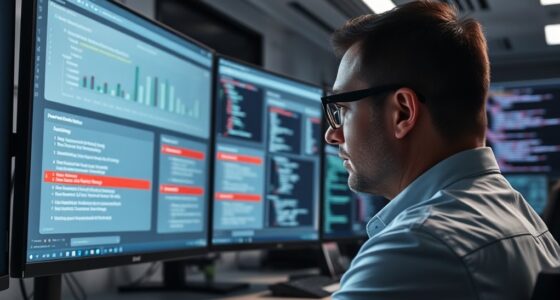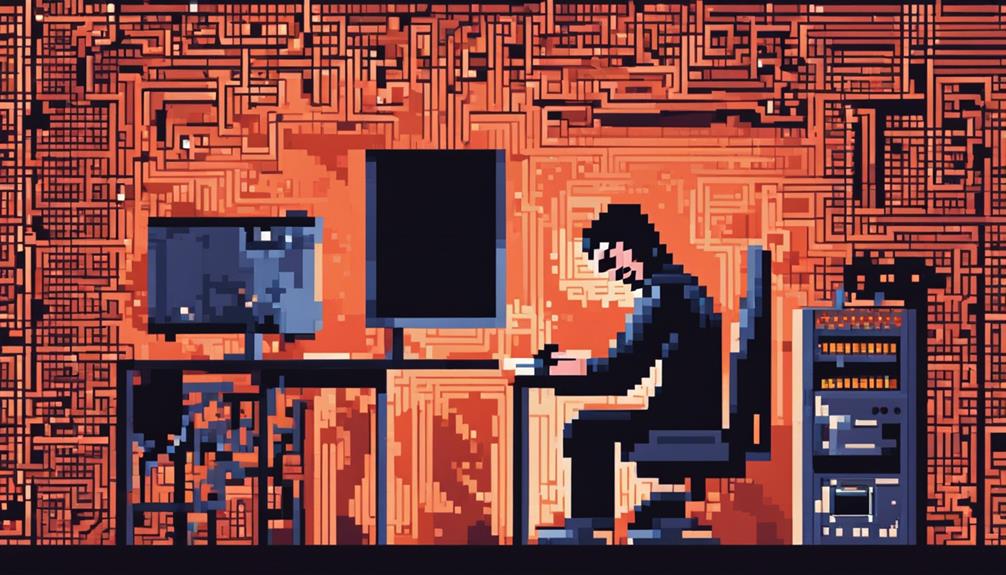AI-powered cyber threats are rapidly evolving, allowing attackers to launch sophisticated, large-scale assaults in minutes. With machine learning, they can automate tasks like creating convincing phishing emails and adapting attack strategies on the fly. The speed and complexity of these attacks outpace traditional security measures, making detection increasingly difficult. As the landscape shifts, it’s essential to stay aware of these emerging threats and innovations in cybersecurity for better protection. There’s much more to uncover about these challenges and defenses.
Key Takeaways
- AI enables cybercriminals to automate phishing and create convincing fake communications, increasing the success rate of attacks.
- Machine learning enhances the speed and complexity of cyberattacks, allowing attackers to adapt in real-time to security measures.
- Advanced algorithms can analyze vast amounts of data, making it easier for hackers to identify vulnerabilities and execute large-scale attacks quickly.
- Organizations must implement adaptive threat detection systems to counter evolving AI-driven cyber threats effectively.
- Continuous updates in cybersecurity technologies are essential to keep pace with the rapidly changing landscape of AI-powered attacks.

Have you ever wondered how artificial intelligence is transforming the landscape of cyber threats? As technology evolves, so do the tactics used by cybercriminals. They’re now leveraging AI to create more sophisticated attacks that can outsmart traditional security measures. This shift raises significant concerns for individuals and organizations alike, as the stakes are higher than ever.
Machine learning has become a vital component in the toolkit of cybercriminals. By analyzing vast amounts of data, these malicious actors can identify patterns and develop strategies that were previously unimaginable. For instance, they can automate the process of crafting phishing emails, making them more convincing and harder to detect. Picture receiving an email that looks identical to one from your bank, complete with logos and formatting—it’s a frightening reality, and it’s becoming increasingly common.
Machine learning empowers cybercriminals to craft highly convincing phishing attacks, blurring the line between real and fake communications.
On the flip side, organizations are also harnessing machine learning to bolster their defenses. With advanced threat detection systems, they can analyze network traffic in real-time, spotting anomalies that may indicate a breach. By employing algorithms that learn and adapt over time, these systems can improve their accuracy and speed, detecting threats before they escalate. Imagine having a security system that gets smarter every day, recognizing new attack vectors as they emerge.
However, the arms race between cybercriminals and defenders is a double-edged sword. While organizations adopt cutting-edge technologies to counteract threats, hackers continuously refine their methods. For example, AI can be used to create deepfakes, which can complicate identity verification processes. With AI-generated content becoming more sophisticated, you might find it challenging to discern what’s real and what’s not.
Moreover, the speed at which these attacks can be executed is alarming. Cybercriminals can use AI to launch large-scale attacks in a matter of minutes, overwhelming security systems designed to handle smaller, more traditional threats. The speed of machine learning algorithms enables attackers to adjust their strategies on the fly, making it even harder for organizations to keep up.
In this digital battleground, staying informed about AI-powered cyber threats is essential. As an individual or a business, understanding the implications of these technologies can help you better prepare and protect yourself against potential breaches. Embracing advanced threat detection and machine learning may be your best defense in this evolving landscape. Stay vigilant, because the world of cyber threats is changing rapidly, and you need to keep pace. Additionally, the evolving landscape of trailer music composition is also influenced by emerging technologies that shape how audio and sound are integrated into media security narratives.
Frequently Asked Questions
How Can Individuals Protect Themselves From Ai-Powered Cyber Threats?
To protect yourself from AI-powered cyber threats, focus on enhancing your personal security and AI literacy. Regularly update your software and use strong, unique passwords to safeguard your accounts. Be cautious of suspicious emails and links, as they might be AI-generated scams. Educate yourself about AI technologies and their potential risks; understanding these can help you recognize threats. Finally, consider using security tools that utilize AI for better detection and prevention of attacks.
What Industries Are Most Vulnerable to Ai-Driven Cyber Attacks?
The financial sector and healthcare industry are among the most vulnerable to AI-driven cyber attacks. Imagine a bank vault left wide open; that’s how exposed these sectors can be. With sensitive data and financial transactions, hackers can exploit AI to bypass traditional security. In healthcare, patient records are goldmines for cybercriminals, making hospitals prime targets. You need to be proactive, ensuring robust cybersecurity measures to protect your sensitive information in these high-risk areas.
Are There Any Laws Regulating AI Use in Cybersecurity?
Yes, there are some laws regulating AI use in cybersecurity, but they’re still evolving. You’ll find that various countries have begun implementing AI regulations and cybersecurity legislation to address emerging threats. These laws aim to guarantee responsible AI deployment while protecting sensitive data and maintaining privacy. However, as technology advances, the regulatory landscape will likely continue to change, so it’s essential for you to stay informed about the latest developments.
How Does AI Enhance Traditional Cyber Attack Methods?
AI enhances traditional cyber attack methods by introducing sophisticated techniques that can leave you feeling vulnerable. With automated infiltration, attackers can breach systems with alarming efficiency, bypassing defenses that once seemed secure. Adaptive malware evolves in real-time, adjusting its tactics to exploit your weaknesses more effectively. This combination makes it increasingly difficult for you to detect and defend against these threats, turning your digital landscape into a battleground where the odds are heavily stacked against you.
What Are the Ethical Implications of Using AI in Cybersecurity?
Using AI in cybersecurity raises significant ethical implications. You’ll need to contemplate algorithmic bias, which can lead to unfair targeting or discrimination against certain groups. Additionally, privacy concerns emerge as AI systems might collect and analyze vast amounts of personal data without consent. It’s vital to balance the benefits of AI in detecting threats with these ethical considerations to guarantee that security measures don’t infringe on individual rights or exacerbate existing inequalities.
Conclusion
As you navigate the shadowy landscape of AI-powered cyber threats, picture a storm brewing on the horizon. These next-generation attacks are like elusive phantoms, morphing and adapting with every defensive move you make. Staying vigilant is essential, as the digital domain becomes a battlefield where innovation and deception dance in a dangerous waltz. Embrace proactive measures, sharpen your defenses, and remember—this is just the beginning of an ongoing fight for security in an ever-evolving world.









